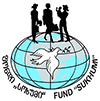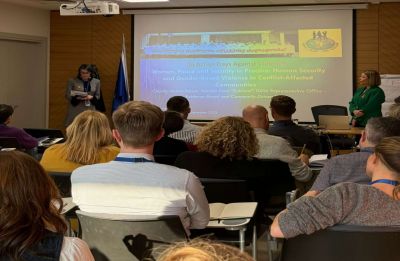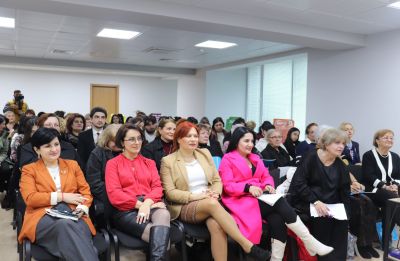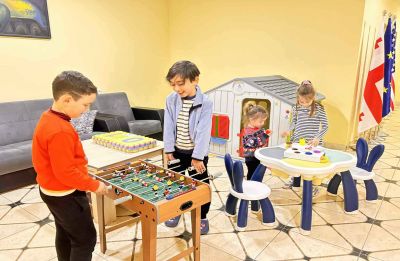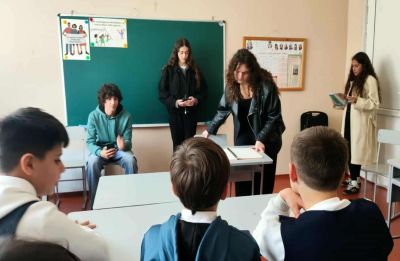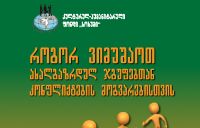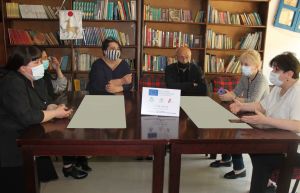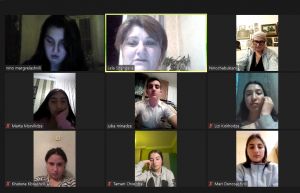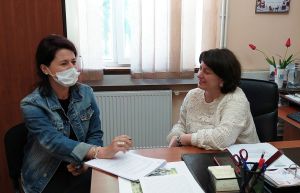Imereti Scientists Union of "Spectri" held another consultation meeting with partner organizations: "Center for Education and Equality" and "Young Teachers Union" in Ozurgeti.
During the meeting, the current issues were discussed, they talked about the measures envisaged in the working plan of the new projects financed by the sub-grant from the side of partner organizations and their monitoring, as well as the local needs research of the citizens.
The work is carried out in the framework of the project “A common forum for CSOs from Guria, Imereti and Racha-Lechkhumi for PAR Roadmap monitoring”.
Here is an interesting travel for you. You have never seen or heard of such a thing before.
Traveling online - as it corresponds to Covid pandemic.
Follow us…
The first station –Lanchkhuti official web page http://lanchkhuti.gov.ge/
Take a look to the right of the screen. Everything seems to be familiar in the list, but there is one different name: electronic manager https://lcman.ge/
This is precisely the innovation that we must tell you about - a unique web application that has no analogue in Georgia (and not only). It was created especially for Lanchkhuti. The author of the application is Amiran Gigineishvili - radio engineer, programmer, designer, researcher, economist, PR specialist.
Mr. Amiran is a member of Lanchkhuti City Council and a member of the board of the Local Governments Association of Georgia. He has many years of working experience in civil society organizations, participated in more than 40 trainings in the USA and various European countries. At the moment he is the chairman of the "Georgian Rural Hall" http://www.darbazi.org.ge/
Violence victim faces many problems.
It is not a secret that the state can offer only temporary shelter and legal responsibility for the rapist. After leaving the shelter, the victim, with the minor children, is in the hardest situation and the friendship network is vital for her. It gives her a feeling of more or less stability and security.
The Fund “Sukhumi” has always expressed an idea of multidisciplinary cooperation and coordination in order to respond to the problem of violence against women and domestic violence. Number of round tables, information meetings or civil forums were held, permanently emphasizing proper coordination and consolidation of resources in the field of violence prevention, especially in direction of victim assistance.
The Fund "Sukhumi" has established the following model - a non-formal group is successfully functioning. It is conditionally called the social partners network for victim assistance.
It includes: specialists of social directions of the fund, psychologist, lawyer; social service structures of local self-government, especially the Department for the Protection of Children’s Rights;
“It is necessary to talk about these topics at our age”, “Non-formal education gives us what we do not receive at school”, “I will definitely share this knowledge with everyone” - this is the feedback from the participants at the end of the training.
In the first half of May, 5 online trainings were held with young people from Tsalenjikha, Chokhatauri, Bagdati, Zugdidi and Senaki municipalities on the following topics: reasons of conflict, tolerance and bullying.
Groups like this format, they are motivated and active, they are involved in discussions. Their frankness should be noted. Leaders are ready to hold informational meetings with peers and share their knowledge. They choose topics out of three directions presented at the training, and most important is that they are very serious and responsible towards their work.
Live meetings would be much more interesting with group work and role-games, but the Covid pandemic does not yet provide such an opportunity.
The Fund "Sukhumi" has 10 Women Support Centers in Terjola, Vani, Tkibuli, Bagdati, Chokhatauri, Samtredia, Kobuleti, Zugdidi, Senaki, Tsalenjikha municipalities. A two-day workshop was held for the updated staff of mobilizers. All discussed topics were necessary and relevant: selecting target groups, working with the audience, identifying problems, filling in a victim questionnaire and responding to it, conducting advocacy campaign, legal mechanisms for victim support, working with local governments, municipal programs and state services for violence prevention and victim assistance, informing, self-presentation, facilitation and moderation.
“The work of the mobilizer seemed difficult to me, but now I already know how to go step by step. The workshop showed me the sequence of the process”, mentioned one of the mobilizers at the end of the workshop.
A round table on: "Results of the implementation of public monitoring of the action plan of public administration reform in Ozurgeti municipality" was held in Ozurgeti.
The meeting was attended by representatives of local government, NGOs, mass media, small businesses, teachers, stakeholders.
The representative of the partner organization of Imereti Scientists’ Union "Spectri" spoke about the importance of civil society inclusion in monitoring the roadmap for public administration reform.
Representatives of Guria partner organizations: "Center for Education and Equality" and "Young Teachers’ Union" familiarized the participants with the results of the third monitoring, conducted by them and noted the positive trends and new challenges identified after the monitoring.
Georgian Rural Hall is one of the most successful civil society organizations and our active partner in Lanchkhuti. Within the framework of the sub-grants component, the organization has implemented a small project “E-communicator of accountability and transparency for Lanchkhuti municipality”.
The monitoring time has come: representatives of Imereti Scientists' Union “Spectri” got acquainted with the progress of the project and attended one of the meetings that the Georgian Rural Hall held for local civil society organizations.
The project manager Amiran Gigineishvili presented a version of the web application, which he developed with the programming language ASP.NET C ++ using MS SQL server. The algorithm for sending a letter by a citizen and receiving a response, as well as public information, was discussed. The participants of the meeting independently sent e-mails and worked in other fields in test mode.
Women and girls needs research in 6 municipalities of Western Georgia - Kutaisi, Tskaltubo, Khoni, Senaki, Zugdidi and Tsalenjikha - was completed.
1000 respondents were interviewed through the questionnaires, 24 in-depth interviews and 24 focus - group meetings were held for qualitative research.
In May, the systematization of the research results will be held, and this will become the basis for the analysis. In frames of the project, it is also envisaged to develop a plan and further work to advocate the needs of local target groups at local and central levels.
The article in the newspaper "New Education" starts like this:
Within the framework of the project "Strengthening the Women's Rights in Western Georgia", the Fund “Sukhumi” has started to establish youth centers in 10 cities of Western Georgia (Kobuleti, Senaki, Tsalenjikha, Zugdidi, Samtredia, Vani, Terjola, Tkibuli, Bagdati). In agreement with local governments and resource centers, the Fund “Sukhumi” cooperates with youth departments, on the basis of which youth empowerment centers are established.
Link: https://bit.ly/3ew5m3x
Projects of 16 experienced and 14 new organizations - new ideas, interesting initiatives!
Specifically:
In 2019, within the framework of the project, the Forum of Civil Society Organizations was established, which joined 16 organizations from 8 municipalities. They participate in many activities. For them, a mini-grants competition was announced for the second time. And all 16 small projects were financed, just like the first time.
This time there is an innovation: in recent months, our project has contributed to the creation of 14 new organizations in Imereti, Guria and Racha-Lechkhumi. Moreover, it was decided to support their first projects.
On April 28, during the ordinary meeting of the competition committee, the results of the evaluation of project applications were discussed and a decision on their financing was made.
Thus, 30 small projects have been financed. Their implementation has already begun in Vani, Khoni, Bagdati, Terjola, Tsageri, Ambrolauri, Lanchkhuti and Ozurgeti municipalities.
